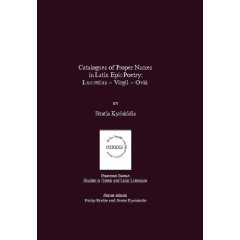
Stratis Kyriakidis, Catalogues of Proper Names in Latin Epic Poetry. Lucretius - Virgil - Ovid.
Newcastle, Cambridge Scholars Publishing, collection Pierides. Studies in Greek and Latin Literature, 2007, 219 p.
- ISBN : 9781847181466
- 69.99 $
Reviewed by Christopher Francese (Dickinson College) dans Bryn Mawr Classical Review 2009.01.08.
Présentation de l'éditeur :
The book consists of two main parts: a) Structure and Contents, b)Catalogues in Context: In the first part the major subject is how acatalogue is organized internally. A number of structural patternsformed since Homer on the basis of the position the names held withinthe catalogue (density in the middle - spacing in the middle -ascending/descending mode - internal balance - erratic pattern) were to continuedown to the period of Lucretius, Virgil and Ovid. Each pattern carriesits own dynamism in the text and has its particular effects in thereading process. Especially when the poetic work evolves in time, thefluctuation of the density in names per verse entails a correspondingfluctuation of the narrative tempo. On occasion the reader may alsorecognize in the structure of the catalogue a visual parallel to thesituation described. Mirroring technique -widely applied in literaryand artistic works in antiquity- finds its place in the poeticcatalogues of the period and can be distinguished in three majorcategories: the extratextual, the intertextual, and the intratextual.In Ovid the technique became most sophisticated. The second part dealswith the relation of the catalogue to its surrounding text. In thisrespect, catalogue-markers and the way a catalogue is introduced orcompleted are issues which are discussed in this part of the work, asthey can be indicative of the way the poet views the contents of acatalogue. What becomes evident here is that the usualcatalogue-markers are the products of the notion that whoever orwhatever is included in a catalogue is listed there as an individualentity, even if some of its characteristics are neutralized. Thisproves to be true in Virgil where the items of a catalogue retain theirvalue whereas frame and content function in support of each other. Thisalso occurs in the greater part of the epic tradition. Before Virgil,however, in Lucretius, the frame was often the means of subverting thetraditional function of a catalogue, since it usually called intoquestion the very existence of the beings named, or undermined theirvalue. On some occasions, a Virgilian catalogue does not close with averbal frame but with a pause. This mode of closure proves to be thestrongest boundary between a catalogue and the continuation of thenarrative. On other occasions we shall find a simile at the end of acatalogue. These closural devices stress the catalogue s potentials asthey affect the reading process. Things change in the OvidianMetamorphoses. Ovid makes extensive use of various poetic techniquesand devices which he draws from the tradition in general and Virgil inparticular. In doing so, however, he often challenges theirsignificance and forms catalogues that give the impression of delaying,by protracting the oncoming narrative. In Ovid s work neither the pausenor the simile can easily constitute natural barriers to hiscatalogues. Everything in the Metamorphoses is in a continuous state offlux and the catalogue, too, has to adapt accordingly by acquiring newcharacteristics with novel values. This book is the first of the seriesPierides, series editors: Philip Hardie - Stratis Kyriakidis.
STRATIS KYRIAKIDIS is Professor of Latin Literature in the Universityof Thessaloniki. He is the author of Roman Sensitivity: A Contributionto the Study of the Artistic Receptiveness and Creativity of the Romans(146-31B.C.), Thessaloniki 1986 [in Greek] and of Narrative Structureand Poetics in the Aeneid: The Frame of Book 6, Bari 1998. WithFrancesco De Martino he is the co-editor of Middles in Latin Poetry,Bari 2004. His articles are mainly on Latin literature of the lateRepublican and Augustan periods and on the Latin centos.